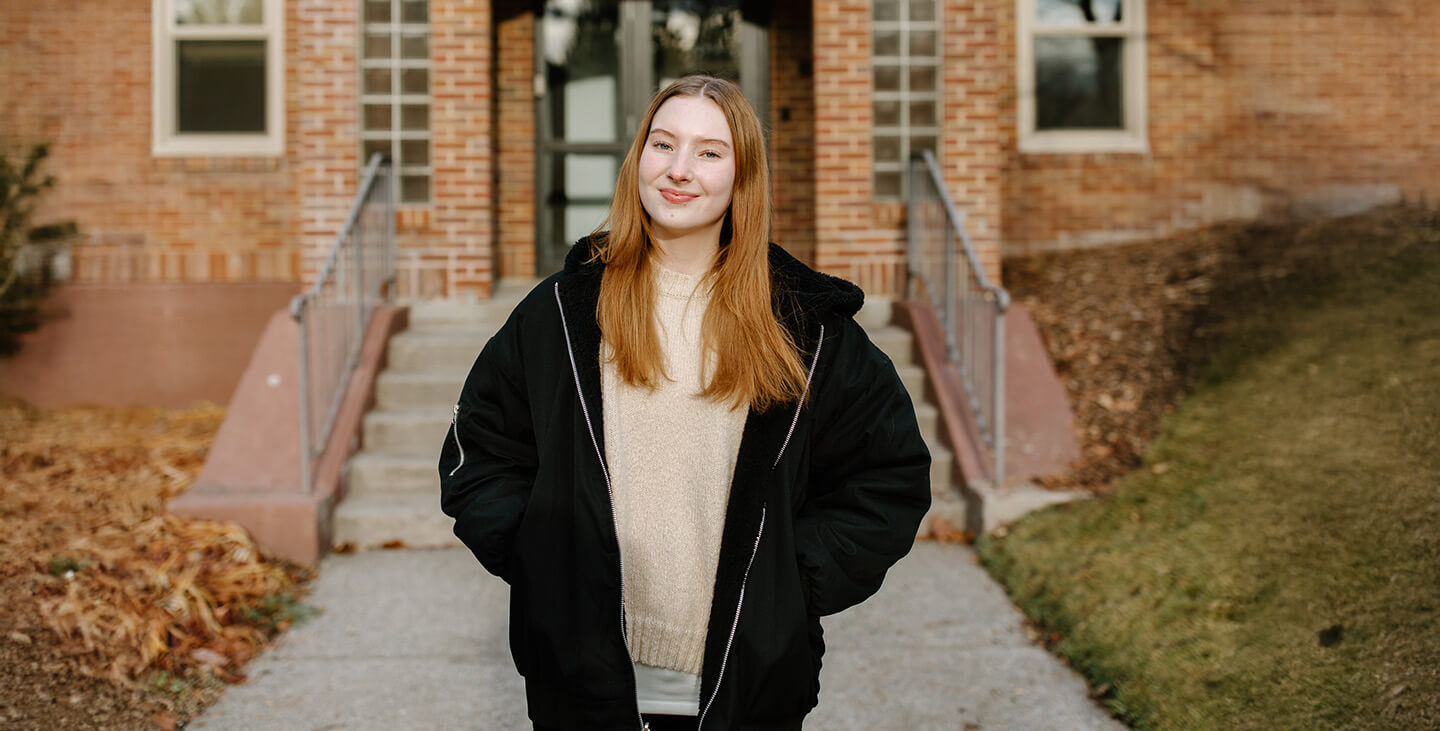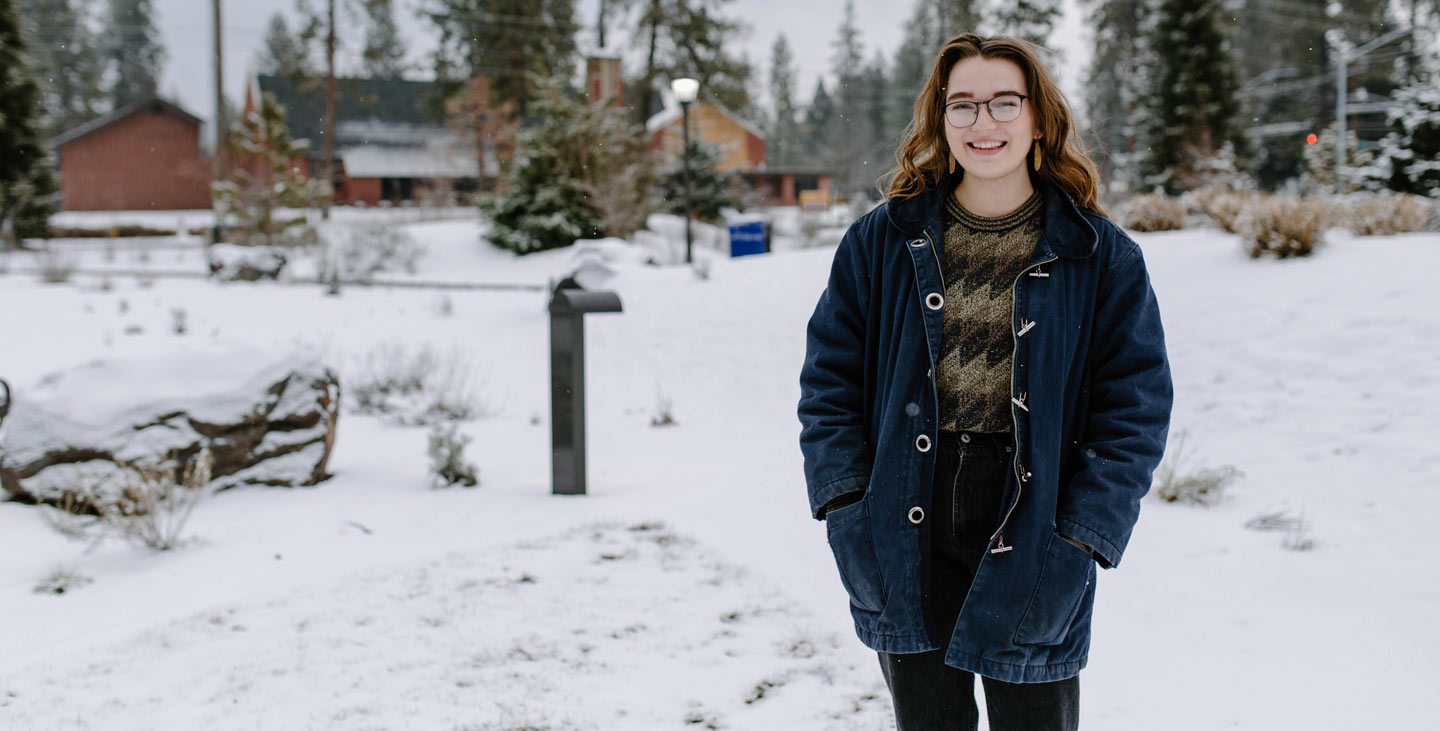Sociology
 Mariia Yazepova '26
Mariia Yazepova '26
Why did you decide to study sociology?
I chose to study sociology because I'm passionate about social justice and understanding society. I believe that by looking at different social structures, we can confront injustices and fight for change. Plus, I enjoy social sciences as a whole – it's all about analyzing society, not solving for x.
What classes have been your favorite so far?
So far, my favorite classes have been Deviance, Crime & Criminal Justice and Families & Society. I appreciate how the criminal justice course looks into the legal system and social justice while Families & Society looks at the dynamics of family structures and their influence on our society. Both classes push me to think about how institutions influence our lives.
Tell us about a unique experience you've had or project you've worked on for your major.
We had to break silent social norms and expectations as part of a project in my Sociological Theories class, and the reactions were priceless – people were really confused, and it was a great way to see how deeply ingrained our social behaviors are. It showed how much we take unspoken rules for granted.
What advice would you give to someone thinking about majoring in sociology?
If you're thinking about majoring in sociology, prepare to overanalyze every social interaction you've ever had. But really, don't be scared to question the status quo, be curious and ask plenty of questions. Oh, and practice writing essays – you'll end up being best friends with your keyboard.
What's your dream job?
A career in law, especially related to social justice activism, would be my dream job, though I'm keeping an open mind and waiting to see where God leads me. All I want is to find a way to have a positive influence on the world!
Who are three people who have made a difference for you at Whitworth?
At Whitworth, a lot of people have had a significant impact on my life: my debate coach, Mike Ingram, who encouraged me to think critically and speak with confidence; Dr. Erica Salkin and Dr. Jason Wollschleger, whose love of communication and sociology, respectively, motivated me to be better in those fields; and Trina Allen, my international student advisor, who has consistently provided support and direction when I needed it.
What's something that surprised you about your major?
The fact that sociology actually requires a very small amount of math shocked me and may surprise other students as well. I came here to stay away from numbers, but now I'm attempting to understand statistics. It turns out that sometimes even social justice requires a calculator.
Why did you choose to attend Whitworth?
Whitworth's Christian ideals and the tight-knit, encouraging environment that comes with being a smaller institution inspired me to attend this school. I can develop both intellectually and spiritually here, among people who actually care about one another.
 Justyce Brant '22
Justyce Brant '22
Why did you decide to study sociology and environmental science?
I decided to major in sociology and environmental science because I believe the current state of the world requires a multifaceted solution. In order to understand and address our ongoing ecological crisis, it needs to be viewed from an anthropocentric perspective. In other words: Because humans have created the problem, humans must also be part of the solution. I enjoy studying sociology in order to understand how society has evolved into its present state and to anticipate the direction it is heading. Studying the intersection between society and the environment grants me the tools necessary to address several of our most pressing problems including climate change, poverty, and social and environmental injustices.
What are some of your favorite classes so far?
It is too hard to decide! In regard to environmental science, my two favorite classes have been Environmental Ethics with Jonathan Moo and Introduction to Environmental Science with Grant Casady. Environmental Ethics allowed me to ground my ecological convictions and understand what truly drives my passions for the environment. Introduction to Environmental Science was the first class that prompted me to take action. After learning the basics of our ecological crisis, I changed many things about my lifestyle in addition to becoming an environmental leader and advocate on campus and within Spokane sustainability organizations. In regard to sociology, my favorite class I have ever taken is Race & Ethnicity with Jason Wollschleger. I think given the social climate of 2020 it is imperative to educate oneself on the struggles that people of color have historically faced and are currently facing. That class has enabled me to be aware of my privilege, encouraged me to spread wisdom on anti-racism, and has revealed to me the intricacies of a racist social system.
Tell us about a unique experience or project you've worked on for your major.
I am sure there will be many fun projects to come, but there have been several that were exceptionally meaningful. One project I did for my History & Sociology of the Black Church class allowed me to visit historical Black churches in Spokane and meet some of the nicest people I have ever met. I took field notes for the first time and then conducted an extensive research project using geographic information systems where I focused on the importance of gospel music within the Baptist Church. It was my first “sociological” research, and it was an experience I will never forget. For Environmental Ethics with Jonathan Moo, there is a required six hours of outdoor volunteer time. I had the privilege of working with the Spokane Riverkeeper to clean trash along the Spokane River, and I also volunteered with the Lands Council to increase urban canopy cover in the West Central district of Spokane. These projects mean so much to me because I was able to connect with other environmentally conscious people and give back to my community.
What advice would you give to someone thinking about majoring in these areas?
For those considering majoring in sociology, I would advise them to let go of any presuppositions of societal structure. Sociology is much easier to comprehend when approached without preconceived notions, and once learned, one may form an opinion about the subject matter. Entering class with firm beliefs may cause students to fall victim to confirmation bias and miss a fantastic learning opportunity. For those pursuing environmental science, I would advise them to have hope. It can be rather depressing learning about the state of the environment because it seems overwhelmingly difficult to change; however, without hope nothing can be done and all our efforts will be futile. We must have faith in the process towards a better future. For both majors, and perhaps all majors, I would encourage students to take what they learn and actively apply it. If there is something you have learned that upsets you, intrigues you, confuses you, then use that as motivation and do something about it! If you think there is something wrong about society or if you notice an unsustainable habit, ask yourself what you can do to change it. Too many people are unaware of their power and potential to change the world around them for the better.
What's your dream job?
My dream job would be to work for a nonprofit organization or as a social consultant who helps to preserve wildlife habitats through engaging communities who have experienced environmental racism. The impoverished and underprivileged are harmed the most through global climate change, and I believe working with them to preserve natural habitats is part of the solution.
Who has been an important connection for you at Whitworth, and why?
I have been able to meet so many incredible people at Whitworth who have encouraged and helped me navigate my Whitworth experience. My freshman year of college was a difficult transition period, and I would have been a mess without the guidance and patience of Erica Salkin (associate professor of communication studies). I am also very thankful for my professors Grant Casady, Jonathan Moo, Jason Wollschleger, Stacy Keogh and Bob Francis who all encouraged me to believe in myself and realize my potential.
What is something that has surprised you about your major?
What continuously surprises me about studying sociology and environmental science is how I am able to apply my majors to my life right now. Most majors aren't applicable until after four years of study, but every day after a sociology or environmental science class I have learned something that is able to inform my present decisions.